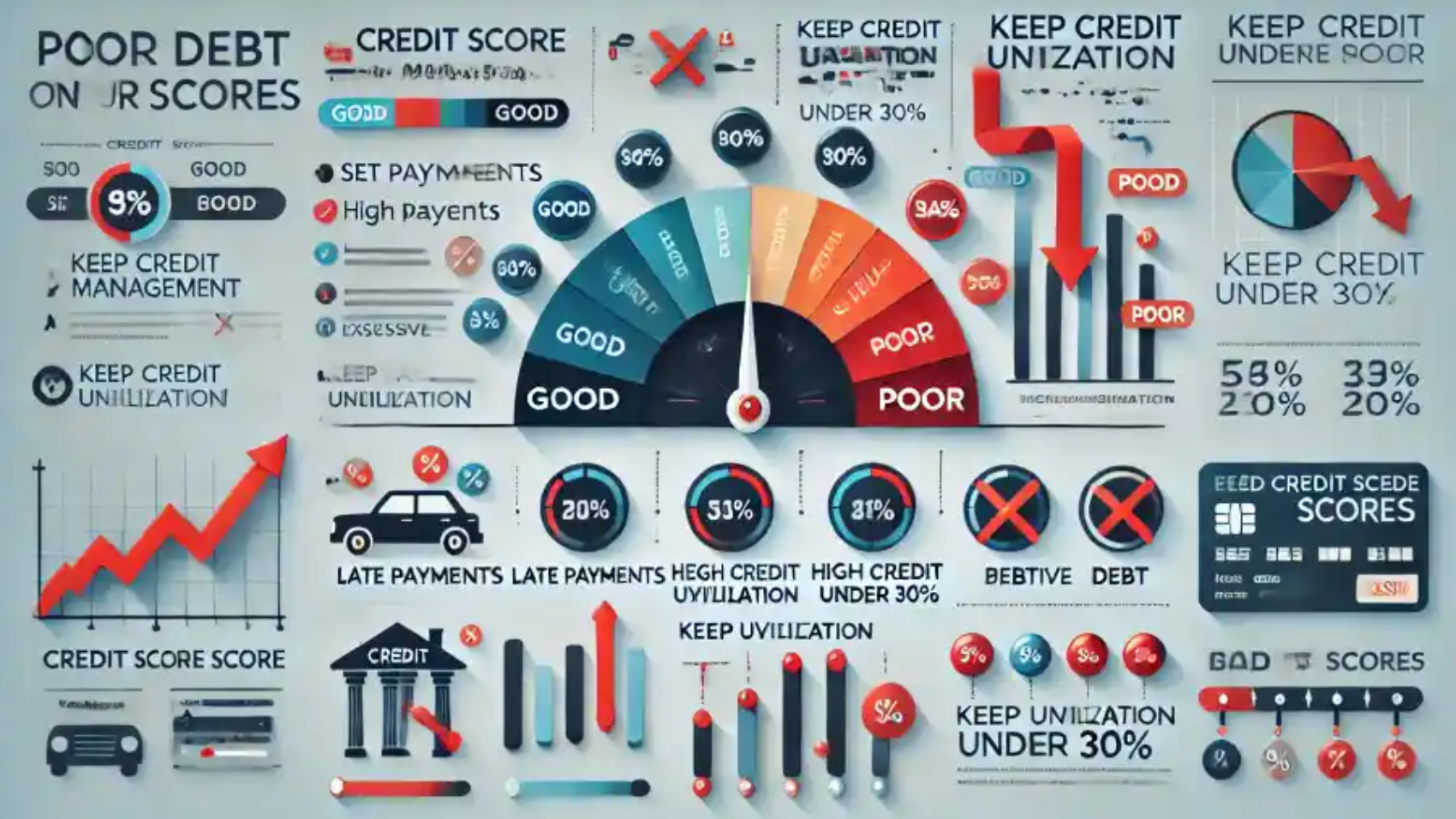Your credit score is a vital part of your financial health. Did you know that 35% of your credit score is determined by your payment history, and even a single missed payment can drop your score by 100 points? Mismanaging debt can have a domino effect, leading to higher interest rates, limited credit options, and even job application rejections in some industries.
So, what exactly happens to your credit score if you fail to manage your debt wisely? This question is more than just theoretical—it’s a financial reality faced by millions. Understanding this can save you from years of financial hardship and help you achieve long-term stability.
Let’s dive into the causes, consequences, and solutions.
What Happens to Your Credit Score If You Mismanage Debt?
Mismanaging debt has direct and measurable impacts on your credit score. Here’s how:
1. Late or Missed Payments (35% of Your Score)
Payment history is the single most important factor in your credit score. Missing just one payment can cause your score to plummet. For example:
- A person with a 780 credit score could see their score drop by 90–110 points after a 30-day late payment.
- Late payments stay on your credit report for up to seven years.
Actionable Tip: Automate your payments or set reminders to avoid this mistake.
2. High Credit Utilization (30% of Your Score)
Your credit utilization rate—the percentage of your credit limit you’re using—plays a crucial role. Using more than 30% of your available credit signals financial instability. For instance:
- If you have a $10,000 limit and a $6,000 balance, your 60% utilization rate will negatively affect your score.
Example: Jane had a 750 credit score but maxed out her credit cards to cover unexpected expenses. Her score dropped to 660, making her ineligible for low-interest loans.
Actionable Tip: Keep your utilization rate below 30%, ideally under 10%.
3. Accumulating Excessive Debt
Lenders look at your debt-to-income ratio and total outstanding balances. Carrying large amounts of debt not only lowers your score but also limits your borrowing options.
Impact:
- High balances can make you appear over-leveraged.
- Lower credit scores result in higher interest rates, costing you more in the long run.
Actionable Tip: Use strategies like the debt avalanche method (paying off high-interest debt first) to reduce your balances.
4. Frequent Applications for Credit
Applying for multiple credit accounts in a short period results in hard inquiries, which can reduce your score.
- A hard inquiry typically lowers your score by 5–10 points.
- Multiple inquiries can indicate financial distress to lenders.
Actionable Tip: Only apply for credit when necessary, and consider pre-qualification checks that don’t impact your score.
Rebuilding a Damaged Credit Score
If your credit score has already taken a hit, all is not lost. Here’s how you can recover:
- Use Secured Credit Cards: These cards require a deposit and help establish positive payment history.
- Negotiate with Creditors: Request lower interest rates or repayment plans to ease your financial burden.
- Pay Off Small Debts First: Success with smaller debts can motivate you to tackle larger ones (the debt snowball method).
- Avoid Closing Old Accounts: Keeping accounts open increases the average age of your credit, improving your score.
The Benefits of Managing Debt Wisely
On the flip side, proper debt management comes with tangible rewards:
- Lower Interest Rates: A higher credit score qualifies you for better loan terms.
- Access to Premium Credit Cards: Good scores unlock cards with cash-back offers, travel rewards, and lower APRs.
- Improved Financial Stability: With better credit, you can handle emergencies without resorting to high-interest loans.
Other Issues to Watch For
- Emotional Impact: Debt-related stress can lead to anxiety and strained relationships.
- Employer Credit Checks: Some employers review credit reports for roles involving financial responsibility.
- Future Loan Eligibility: A low credit score could hinder your ability to buy a home or car.
Actionable Tip: Use financial wellness resources or apps like Mint and YNAB to stay on track.
Conclusion
Mismanaging debt doesn’t just harm your credit score—it affects every facet of your financial life. By understanding how factors like late payments, high credit utilization, and excessive debt impact your score, you can take proactive steps to safeguard your financial future.
Key Takeaways:
- Pay your bills on time and keep your credit utilization low.
- Avoid applying for unnecessary credit accounts.
- Leverage tools like budgeting apps and credit monitoring services to stay on top of your finances.
Don’t let debt derail your goals. Start managing your finances wisely today and unlock the doors to better opportunities tomorrow.
Have you faced challenges managing your debt? Share your story or ask your questions in the comments below. Don’t forget to explore our related posts on improving financial health and budgeting tips!


[…] When to Transition: If your credit score improves and you’re managing debt wisely, consider upgrading to an unsecured card for higher limits and better perks. Learn more about managing credit wisely. […]